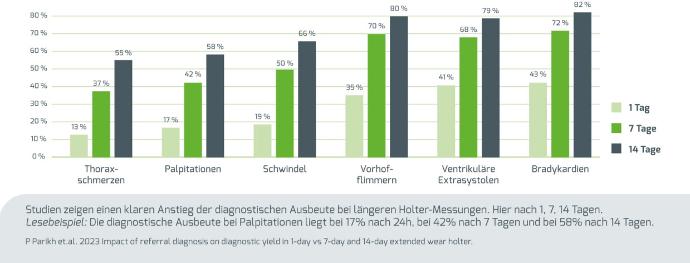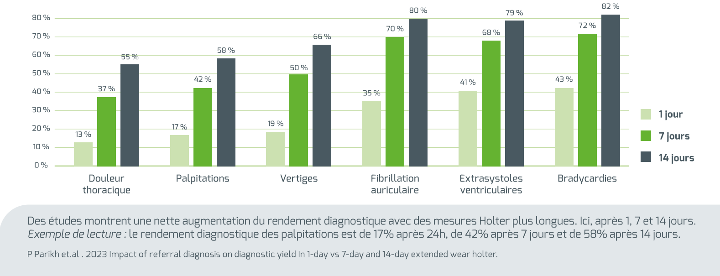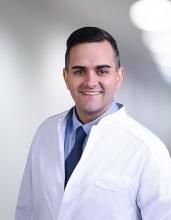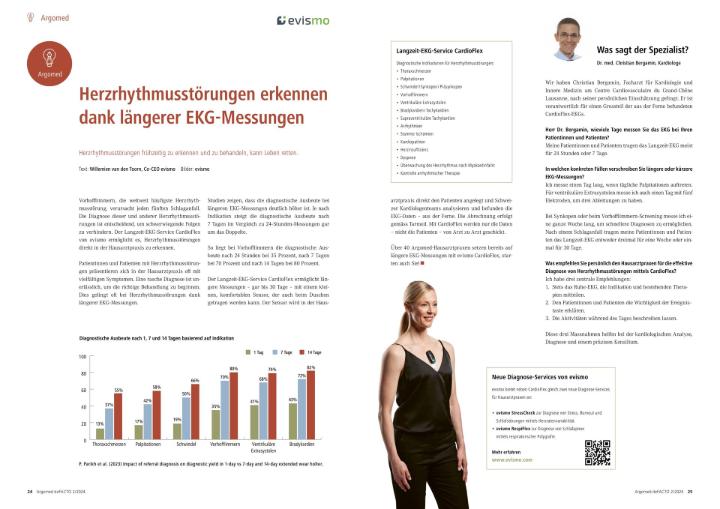Atrial fibrillation, the most common heart rhythm disorder in the world, is responsible for one in five strokes. Diagnosis of this arrhythmia and other heart rhythm disorders is crucial to avoid serious consequences. The CardioFlex long-term ECG service from evismo enables heart rhythm disorders to be detected directly in the family doctor's surgery.
Patients suffering from heart rhythm disorders often present to the family doctor's surgery with a variety of symptoms. Rapid diagnosis is essential if the right treatment is to be started. This is often possible in the case of heart rhythm disorders, thanks to longer ECG measurements.
Studies show that the diagnostic yield is significantly higher with longer ECG measurements. Depending on the indication, the diagnostic yield is even doubled after 7 days compared with 24-hour measurements.
For example, for atrial fibrillation, the diagnostic yield is 35% at 24 hours, 70% at 7 days and 80% at 14 days..
Diagnostic yield at 1, 7 and 14 days based on indication


The CardioFlex long-term ECG service makes it possible to take longer measurements - up to 30 days - using a small, comfortable sensor that can also be worn in the shower. The sensor is placed directly on the patient in the family doctor's surgery, and teams of Swiss cardiologists analyse and evaluate the ECG data - remotely. Billing is in accordance with Tarmed. With CardioFlex, only the data - not the patients - are sent from doctor to doctor.
Langzeit-EKG-Service CardioFlex - Diagnostische
Indikationen
für Herzrhythmusstörungen
- Chest pains
- Palpitations
- Vertigo / syncope / presyncope
- Atrial fibrillation
- Ventricular extrasystoles
- Bradycardia / Tachycardia
- Supraventricular tachycardias
- Arrhythmias
- Silent ischaemia
- Cardiopathy
- Cardiac insufficiency
- Dyspnoea
- Monitoring cardiac rhythm after a myocardial infarction
- Monitoring arrhythmia treatment
What the specialists say

«In the event of syncope or detection of atrial fibrillation, I measure for a whole week to enable a quicker diagnosis.»

«For patients with daily or multi-week disorders, 1 to 3 days of Holter examinations are generally sufficient.»
We asked Dr. Christian Bergamin, a specialist in cardiology and internal medicine at the Centre cardiovasculaire du Grand-Chêne in Lausanne and Dr. Thomas Kofler, a specialist in cardiology and internal medicine at the Kardiologie Gesundheitszentrum Adlergarten in Schattdorf, to give us their personal opinions.
Click here to access the two short interviews:
The article also appeared in the specialist magazinedefacto 02/24by Argomed on pages 24/25.
